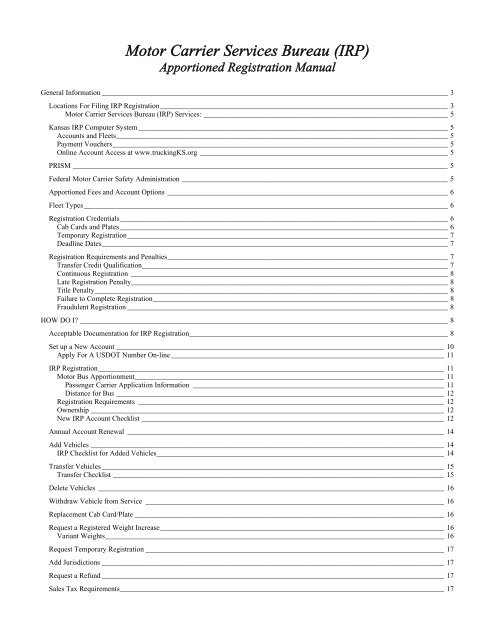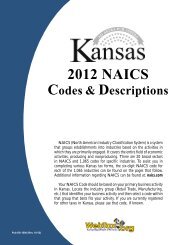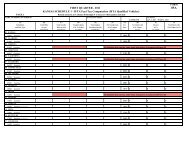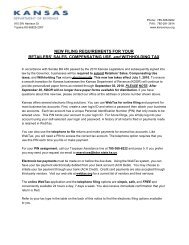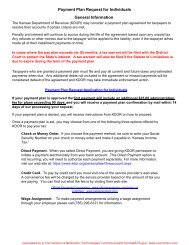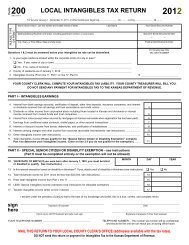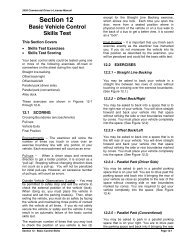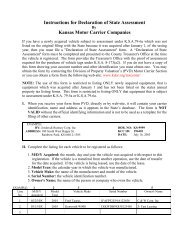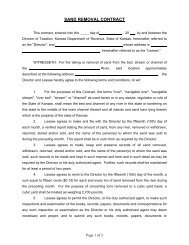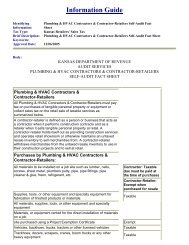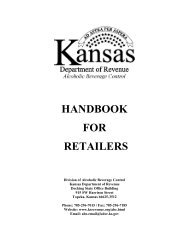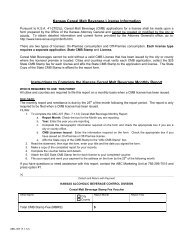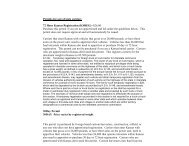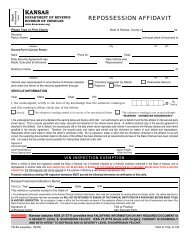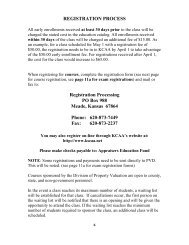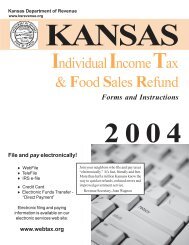Motor Carrier Services Bureau (IRP) - Kansas Department of Revenue
Motor Carrier Services Bureau (IRP) - Kansas Department of Revenue
Motor Carrier Services Bureau (IRP) - Kansas Department of Revenue
Create successful ePaper yourself
Turn your PDF publications into a flip-book with our unique Google optimized e-Paper software.
<strong>Motor</strong> <strong>Carrier</strong> <strong>Services</strong> <strong>Bureau</strong> (<strong>IRP</strong>)<br />
Apportioned Registration Manual<br />
General Information _______________________________________________________________________________________________ 3<br />
Locations For Filing <strong>IRP</strong> Registration_______________________________________________________________________________ 3<br />
<strong>Motor</strong> <strong>Carrier</strong> <strong>Services</strong> <strong>Bureau</strong> (<strong>IRP</strong>) <strong>Services</strong>: ___________________________________________________________________ 5<br />
<strong>Kansas</strong> <strong>IRP</strong> Computer System _____________________________________________________________________________________ 5<br />
Accounts and Fleets___________________________________________________________________________________________ 5<br />
Payment Vouchers____________________________________________________________________________________________ 5<br />
Online Account Access at www.truckingKS.org ____________________________________________________________________ 5<br />
PRISM _______________________________________________________________________________________________________ 5<br />
Federal <strong>Motor</strong> <strong>Carrier</strong> Safety Administration _________________________________________________________________________ 5<br />
Apportioned Fees and Account Options _____________________________________________________________________________ 6<br />
Fleet Types____________________________________________________________________________________________________ 6<br />
Registration Credentials__________________________________________________________________________________________ 6<br />
Cab Cards and Plates __________________________________________________________________________________________ 6<br />
Temporary Registration________________________________________________________________________________________ 7<br />
Deadline Dates_______________________________________________________________________________________________ 7<br />
Registration Requirements and Penalties_____________________________________________________________________________ 7<br />
Transfer Credit Qualification____________________________________________________________________________________ 7<br />
Continuous Registration _______________________________________________________________________________________ 8<br />
Late Registration Penalty_______________________________________________________________________________________ 8<br />
Title Penalty_________________________________________________________________________________________________ 8<br />
Failure to Complete Registration_________________________________________________________________________________ 8<br />
Fraudulent Registration ________________________________________________________________________________________ 8<br />
HOW DO I? _____________________________________________________________________________________________________ 8<br />
Acceptable Documentation for <strong>IRP</strong> Registration_______________________________________________________________________ 8<br />
Set up a New Account __________________________________________________________________________________________ 10<br />
Apply For A USDOT Number On-line ___________________________________________________________________________ 11<br />
<strong>IRP</strong> Registration_______________________________________________________________________________________________ 11<br />
<strong>Motor</strong> Bus Apportionment_____________________________________________________________________________________ 11<br />
Passenger <strong>Carrier</strong> Application Information _____________________________________________________________________ 11<br />
Distance for Bus __________________________________________________________________________________________ 12<br />
Registration Requirements ____________________________________________________________________________________ 12<br />
Ownership _________________________________________________________________________________________________ 12<br />
New <strong>IRP</strong> Account Checklist ___________________________________________________________________________________ 12<br />
Annual Account Renewal _______________________________________________________________________________________ 14<br />
Add Vehicles _________________________________________________________________________________________________ 14<br />
<strong>IRP</strong> Checklist for Added Vehicles_______________________________________________________________________________ 14<br />
Transfer Vehicles ______________________________________________________________________________________________ 15<br />
Transfer Checklist ___________________________________________________________________________________________ 15<br />
Delete Vehicles _______________________________________________________________________________________________ 16<br />
Withdraw Vehicle from Service __________________________________________________________________________________ 16<br />
Replacement Cab Card/Plate _____________________________________________________________________________________ 16<br />
Request a Registered Weight Increase______________________________________________________________________________ 16<br />
Variant Weights_____________________________________________________________________________________________ 16<br />
Request Temporary Registration __________________________________________________________________________________ 17<br />
Add Jurisdictions ______________________________________________________________________________________________ 17<br />
Request a Refund ______________________________________________________________________________________________ 17<br />
Sales Tax Requirements_________________________________________________________________________________________ 17
Titling a Vehicle_______________________________________________________________________________________________ 18<br />
General Titling Information____________________________________________________________________________________ 18<br />
Out <strong>of</strong> State Vehicle Inspection (MVE-1) ______________________________________________________________________ 19<br />
Title Applications _________________________________________________________________________________________ 19<br />
Assignments <strong>of</strong> Ownership __________________________________________________________________________________ 19<br />
Title Only/Special Title_____________________________________________________________________________________ 19<br />
Vehicle Ownership Change Only _____________________________________________________________________________ 19<br />
Adding a Vehicle to the Fleet and a New Title Will Be Issued ______________________________________________________ 20<br />
Duplicate Title____________________________________________________________________________________________ 20<br />
Duplicate E-Title__________________________________________________________________________________________ 20<br />
Secured Title Record_______________________________________________________________________________________ 20<br />
Reissue Title _____________________________________________________________________________________________ 21<br />
Selling/Buying Vehicles with Electronic Title ___________________________________________________________________ 21<br />
Notice <strong>of</strong> Security Interests (NOSI) ___________________________________________________________________________ 21<br />
Title Corrections __________________________________________________________________________________________ 21<br />
Repossessions ____________________________________________________________________________________________ 21<br />
Leased Vehicles _______________________________________________________________________________________________ 21<br />
Leasing Rules ______________________________________________________________________________________________ 21<br />
Audit Requirements ______________________________________________________________________________________________ 22<br />
Audit Records ________________________________________________________________________________________________ 23<br />
Retention <strong>of</strong> Records ___________________________________________________________________________________________ 24<br />
REGISTRATION FEES AND GROSS WEIGHT BRACKETS ___________________________________________________________ 25<br />
rev 6.14.2010 2
General Information<br />
<strong>Kansas</strong> is a member <strong>of</strong> the International Registration Plan referred to as the <strong>IRP</strong>. Members <strong>of</strong> the <strong>IRP</strong> include all <strong>of</strong> the United<br />
States as well as Canadian jurisdictions. <strong>IRP</strong> registration is a privilege <strong>of</strong>fered to motor carriers based in <strong>Kansas</strong>, failure to<br />
maintain an adequate safety rating or failure to complete the registration process will result in suspension <strong>of</strong> your account.<br />
Under the <strong>IRP</strong> an owner <strong>of</strong> a <strong>Kansas</strong> based vehicle or fleet shall make application for apportioned registration only to <strong>Kansas</strong>.<br />
<strong>Kansas</strong> will provide each <strong>IRP</strong> jurisdiction information contained in the application. Vehicles registered under the <strong>IRP</strong> shall be<br />
deemed fully registered in all jurisdictions for either inter-jurisdiction or intra-jurisdiction movement.<br />
All <strong>Kansas</strong> <strong>IRP</strong> Account holders are encouraged to use the <strong>IRP</strong> Registration Application at www.truckingks.org. All forms<br />
used for <strong>Kansas</strong> <strong>IRP</strong> Registration are available at www.ksrevenue.org/forms-dmv.htm.<br />
Locations For Filing <strong>IRP</strong> Registration<br />
rev 6.14.2010 3
DO NOT SEND ANY PAPERWORK FOR REGISTRATION OR TITLES TO ANY COUNTY OFFICE OTHER<br />
THAN AN <strong>IRP</strong> REGIONAL OFFICE.<br />
MOTOR CARRIER SERVICES BUREAU (<strong>IRP</strong>)<br />
APPLICATION PROCESSING PROCEDURES<br />
MCSB <strong>IRP</strong> Office Hours are 8 AM to 4:30 PM Will vary during Renewal Season<br />
Faxed applications will be worked in the order received, you must allow 48 – 72 hours before contacting the KTC<br />
(<strong>IRP</strong>) <strong>of</strong>fice. Duplicate faxes will result in the application being denied.<br />
Allow seven business days processing time after payment and all necessary documents are received in the KTC<br />
(<strong>IRP</strong>) <strong>of</strong>fice before credentials will be mailed.<br />
Counter customers may not have more than 2 vehicles per transaction and no more than 2 transactions at one time<br />
unless prior arrangements have been made.<br />
KTC (<strong>IRP</strong>) <strong>of</strong>fice will work renewals over the counter from January 1 to March 1 from 9 AM to 2 PM. After 2 PM<br />
renewals may be dropped <strong>of</strong>f for processing in the order they are received.<br />
Any Faxes received without identifying the <strong>IRP</strong> account number will be discarded.<br />
NO FAXED COPIES WILL BE ACCEPTED FOR ANY TYPE OF RENEWAL DOCUMENTS.<br />
New Accounts must be at the counter prior to 2:00 PM to allow for reasonable processing time.<br />
rev 6.14.2010 4
When you call the <strong>Motor</strong> <strong>Carrier</strong> <strong>Services</strong> <strong>Bureau</strong> (<strong>IRP</strong>), please have your Account Number and<br />
License Plate Number, or Vehicle Identification Number ready.<br />
<strong>Motor</strong> <strong>Carrier</strong> <strong>Services</strong> <strong>Bureau</strong> (<strong>IRP</strong>) <strong>Services</strong>:<br />
Apportioned Registration (<strong>IRP</strong>)<br />
<strong>IRP</strong> Phone: 785-296-6541<br />
<strong>IRP</strong> Fax: 785-296-6548<br />
Central Permit Office<br />
Oversize/Overweight Permits<br />
Phone: 785-368-6501<br />
Fax: 785-296-6558<br />
<strong>Kansas</strong> <strong>IRP</strong> Computer System<br />
The web interface for motor carriers provides real time access to process supplement, create invoices and pay the invoice in the<br />
same session. www.truckingks.org<br />
Accounts and Fleets<br />
The <strong>IRP</strong> system allows one account to have multiple fleets. A carrier may choose to set up multiple fleets based on their travel<br />
requirements, or to separate power units from trailers. Different fleet types may also be maintained under one account. For<br />
example, a registrant may have an <strong>IRP</strong> fleet and a Custom Harvester fleet.<br />
Payment Vouchers<br />
The first page <strong>of</strong> the invoice is the Payment Voucher which must be returned with any mail in payment to ensure that the<br />
payment is properly posted to the correct account.<br />
Online Account Access at www.truckingKS.org<br />
Accounts in good standing will be issued a user id and password for on line access to their account. <strong>IRP</strong> Renewals and all<br />
supplements may be processed on line. The KANPAY application is available to process on line payments <strong>of</strong> invoices for<br />
credit cards or electronic checks.<br />
PRISM<br />
<strong>Kansas</strong> is a member <strong>of</strong> the Performance Registration Information Systems and Management Program (PRISM). All registrants<br />
are required to provide the USDOT number <strong>of</strong> both the motor carrier responsible for safety and the individual vehicle registrant<br />
(if different). The carrier’s safety fitness will be checked prior to issuing vehicle registrations. Unfit carriers may be denied the<br />
ability to register vehicles. You must report, for each power unit, the USDOT number <strong>of</strong> the motor carrier responsible for the<br />
safe operation <strong>of</strong> the vehicle for the registration year. The motor carrier responsible for the safety is the entity that the USDOT<br />
ultimately holds accountable for hours-<strong>of</strong>-service, compliance, drug and alcohol testing, and vehicle maintenance. You are<br />
required to provide the USDOT number and the federal identification number (EIN) or social security number (SSN) at the<br />
time the vehicle is to be registered so we can accurately identify responsibility for each vehicle. Under PRISM rules, carriers<br />
must update the information on the MCS150 form on an annual basis which will be required at renewal, or when opening a<br />
new <strong>IRP</strong> account with this <strong>of</strong>fice.<br />
Federal <strong>Motor</strong> <strong>Carrier</strong> Safety Administration<br />
Apply For A USDOT Number On-line. <strong>Motor</strong> carriers domiciled in the U.S. or Canada may apply for a USDOT number online<br />
and receive the number immediately!<br />
rev 6.14.2010 5
http://safer.fmcsa.dot.gov/<br />
To update your USDOT number, use the same website along with your PIN number to complete your annual update. If you do<br />
not remember your PIN number you can apply for a new one and request that it be mailed to you at this website also.<br />
If you do not wish to complete your filing on-line you can print a copy <strong>of</strong> the MCS-150 and submit it through the mail to the<br />
FMCSA <strong>of</strong>fice or the <strong>Kansas</strong> KTC (<strong>IRP</strong>) <strong>of</strong>fice will also accept this filing.<br />
Apportioned Fees and Account Options<br />
<strong>Kansas</strong> shall determine the percentage <strong>of</strong> miles operated in <strong>Kansas</strong> and each <strong>IRP</strong> jurisdiction to the total miles operated in all<br />
jurisdictions. The percentages applicable to the registration fee <strong>of</strong> each jurisdiction will be calculated and a billing invoice<br />
covering registration will be issued. An optional breakdown <strong>of</strong> registration fees by vehicle is available on more than one<br />
vehicle.<br />
A <strong>Kansas</strong> based registrant in good standing has the option to pay the annual <strong>Kansas</strong> fleet apportioned registration fee on a<br />
quarterly basis.<br />
The payment <strong>of</strong> the <strong>Kansas</strong> annual apportioned registration fee on a quarterly basis applies only to the fee applicable<br />
to <strong>Kansas</strong> and only on a new account, renewal application, or supplemental application which adds vehicles before<br />
March 1.<br />
The amount <strong>of</strong> the <strong>Kansas</strong> annual fee shall exceed $300.<br />
The quarterly payment basis relates only to an alternate method <strong>of</strong> payment <strong>of</strong> the <strong>Kansas</strong> annual fleet apportioned<br />
registration fee.<br />
The first quarterly payment <strong>of</strong> the <strong>Kansas</strong> annual apportioned registration fee, including <strong>Kansas</strong> issuance fees, title<br />
fees and any supporting documents for registration plus all apportioned registration fees due other <strong>IRP</strong> jurisdictions,<br />
must be received on or before March 1 <strong>of</strong> the registration year.<br />
Failure to provide the foregoing requirements on or before March 1 <strong>of</strong> a registration year shall result in the applicant<br />
being required to pay the <strong>Kansas</strong> annual fleet apportioned registration fee in full, including any registration penalties.<br />
Fleet Types<br />
Most fleets will be a fleet type <strong>of</strong> <strong>IRP</strong>; however fleet types <strong>of</strong> Customer Harvester, Intra-State Fleet, Rental Trailers and<br />
Converter Gear are available under specific circumstances.<br />
Registration Credentials<br />
Cab Cards and Plates<br />
<strong>Kansas</strong> will issue a cab card describing each vehicle in the fleet and a license plate. The cab card indicates each <strong>IRP</strong><br />
jurisdiction with which the fleet owner is apportioning the registration and weight allowed in the jurisdiction.<br />
The base <strong>IRP</strong> jurisdiction shall be the only jurisdiction to issue credentials.<br />
When you receive your credentials, check your cab cards for correct information. Your cab card describes your vehicle,<br />
where you go and the maximum weight in each apportioned jurisdiction. If the information is not accurate you may be ticketed<br />
and fined.<br />
Display your apportioned plates on:<br />
The front <strong>of</strong> tractors.<br />
The back <strong>of</strong> straight trucks<br />
rev 6.14.2010 6
The back <strong>of</strong> all trailers.<br />
Temporary Registration<br />
A 30 day temporary registration may be used in lieu <strong>of</strong> your permanent cab card and registration plate when you are<br />
adding/transferring a vehicle, adding a jurisdiction, increasing a registered weight or requesting a replacement credential. A<br />
temporary registration may be faxed. When a temporary registration is issued, all <strong>of</strong> the required documentation must be<br />
provided and the billing invoice must be paid within the 30 day period.<br />
Deadline Dates<br />
The registration year for <strong>Kansas</strong> apportioned vehicles is January 1 through December 31 each year. Your<br />
registration expires on December 31 <strong>of</strong> each year.<br />
<strong>Kansas</strong> apportioned registration renewal applications are sent out <strong>of</strong> our <strong>of</strong>fice by Mid December each year. Please review the<br />
renewals for accuracy and make required changes and return them to our <strong>of</strong>fice as soon as possible or process your renewal online.<br />
We process renewals by date <strong>of</strong> receipt. Please remember these dates so that if you do not receive your next renewal<br />
packet in the mail you will need to contact us.<br />
We encourage renewal payment before February 15. Payments made after February 15 may not<br />
receive cab cards. No Temporary’s and No Extensions are issued for Renewals.<br />
The enforcement deadline for each renewal will begin March 2 <strong>of</strong> each year. Any vehicle that has not registered, which is<br />
required to be registered prior to that date, shall be subject to a penalty <strong>of</strong> $2 for each vehicle. Vehicles in the possession <strong>of</strong> the<br />
owner on and after January 1 <strong>of</strong> a registration year are subject to registration for that year.<br />
Quarterly payment may be an option if received and paid in our <strong>of</strong>fice on or before March 1. Full fees are assessed March 2.<br />
The remaining <strong>Kansas</strong> annual fleet apportioned registration quarterly payments are due and payable on or before:<br />
Second quarter due April 1<br />
Third quarter due July 1<br />
Fourth quarter due October 1<br />
Registration Requirements and Penalties<br />
Transfer Credit Qualification<br />
A vehicle being transferred must have been disposed <strong>of</strong> on or before the unit being added was acquired. Registration<br />
fees not tags transfer on power units only.<br />
Paid registration fees for power units will be transferred if it meets the following criteria: is sold, repossessed, foreclosed by<br />
mechanic's lien, has had the title transferred by operation <strong>of</strong> law or cancellation or expiration <strong>of</strong> a lease agreement or is<br />
otherwise disposed <strong>of</strong> by the owner on or before the date the added vehicle was in the possession <strong>of</strong> the registrant. Copies<br />
<strong>of</strong> supporting documents required.<br />
Example:<br />
Transferred unit is disposed <strong>of</strong> on March 11; the vehicle being added was purchased on March 11. The<br />
registration fees can be transferred.<br />
Transferred unit is disposed <strong>of</strong> on March 11; the vehicle being added was purchased on March 1. The<br />
registration fees cannot be transferred.<br />
rev 6.14.2010 7
Continuous Registration<br />
Provide pro<strong>of</strong> <strong>of</strong> continuous registration must be provided. Continuous registration fees will be processed when applicable.<br />
For example, vehicles purchased more than 30 days prior to registration will be billed for the applicable registration fees.<br />
Vehicles applying for a renewal after March1 will be billed full registration fees beginning on January 1 <strong>of</strong> the renewal year.<br />
Example:<br />
A vehicle is registered on March 15; the purchase date is January 1 <strong>of</strong> the prior year. If no pro<strong>of</strong> <strong>of</strong> registration<br />
can be provided registration, fees will be assessed from January 1 <strong>of</strong> the prior year. If pro<strong>of</strong> <strong>of</strong> registration is<br />
provided for the following year but not the current year, registration fees will be assessed from January 1 <strong>of</strong> the<br />
current year.<br />
Late Registration Penalty<br />
Apportioned fleet registration shall be renewed annually on January 1 <strong>of</strong> each year with such registration to be completed on or<br />
before March 1 <strong>of</strong> each year, and such registration shall expire on December 31 <strong>of</strong> each year. Apportioned fleet registration<br />
fees and other fees prescribed by this act shall be due January 1 <strong>of</strong> each year and shall be payable on or before March 1 <strong>of</strong> each<br />
year. If such registration fees and any other fees prescribed in this act are not paid by March 1 <strong>of</strong> each year, the owner <strong>of</strong> any<br />
vehicle for which such registration fees are delinquent shall be subject to a penalty fee <strong>of</strong> $2 for each fleet vehicle listed in an<br />
original or renewal application, but the sum <strong>of</strong> such penalty fee shall not exceed $100.<br />
Example:<br />
A vehicle is renewed for registered on March 5; the registration penalty fees will be assessed.<br />
Title Penalty<br />
A title fee penalty will be assessed whenever a title is applied for more than 30 days after the date <strong>of</strong> purchase <strong>of</strong> a vehicle.<br />
Example:<br />
A vehicle purchased on March 15, the application for title and registration is not sent until April 20, and the title<br />
penalty fee will be assessed.<br />
Failure to Complete Registration<br />
Failure to complete registration for any application will result in the following disciplinary steps being taken:<br />
Suspension Of The Entire Account<br />
Additional Fees And Penalties Assessed<br />
Notice Of Lien Filed<br />
Tax Warrant Issued<br />
Fraudulent Registration<br />
K.S.A. 8-1,117. Same; fraudulent registration; penalty. Any person or owner who willfully files, or knowingly presents a<br />
fraudulent proration fleet registration application for the purpose <strong>of</strong> obtaining or attempting to obtain or to assist any other<br />
person to obtain a credit or refund for reduction <strong>of</strong> liability <strong>of</strong> proration fleet registration fees applicable under this act shall be<br />
guilty <strong>of</strong> a misdemeanor, and upon conviction there<strong>of</strong> shall be punished by a fine <strong>of</strong> not to exceed five hundred dollars ($500)<br />
or by imprisonment in the county jail for not less than thirty (30) days nor more than six (6) months or by both such fine and<br />
imprisonment.<br />
HOW DO I?<br />
Acceptable Documentation for <strong>IRP</strong> Registration<br />
rev 6.14.2010 8
Documentation<br />
New <strong>IRP</strong> Account<br />
New Owner-Operator Account<br />
Required<br />
See New <strong>IRP</strong> Account Checklist in this Document.<br />
In addition to the requirements for a New <strong>IRP</strong> Account, the following<br />
are required.<br />
Provide pro<strong>of</strong> <strong>of</strong> payment <strong>of</strong> personal property tax (obtain a copy <strong>of</strong> the<br />
Rendition from carrier if you were leased on, or from your local county<br />
treasurer’s <strong>of</strong>fice).<br />
Provide your valid <strong>Kansas</strong> driver’s license with current <strong>Kansas</strong> address.<br />
Provide pro<strong>of</strong> <strong>of</strong> business or home address via copy <strong>of</strong> two <strong>of</strong> the<br />
following items: current utility bill, or rental receipt, or voter registration<br />
card, or school registration receipt.<br />
Sales Tax Exemption<br />
Sales Tax Payment<br />
Pro<strong>of</strong> <strong>of</strong> Ownership<br />
Lease Agreement<br />
Pro<strong>of</strong> <strong>of</strong> Authority exempt from sales tax. Copy <strong>of</strong> exemption certificate;<br />
or tax exemption number.<br />
Sales tax payment is required if the person responsible for payment has<br />
not completed been granted a sales tax exemption prior to 30 days after<br />
the purchase date <strong>of</strong> the vehicle. Copy <strong>of</strong> sales tax payment receipt from<br />
dealer.<br />
Assigned Title or MSO, E-title, County title Receipt, Copy Front and<br />
Back <strong>of</strong> Title that has not been re-assigned<br />
Copies <strong>of</strong> pages that include:<br />
• The complete and full names <strong>of</strong> the lessor and lessee.<br />
• A description <strong>of</strong> the lease or rented vehicle by year, make, and<br />
identification number.<br />
• The effective and expiration dates <strong>of</strong> the lease or rental<br />
agreement.<br />
• The signatures <strong>of</strong> the lessee and lessor or their duly authorized<br />
agents.<br />
Prior Registration<br />
Insurance for Registration<br />
Annual FMCSA Update <strong>of</strong><br />
USDOT Information<br />
UCR Payment<br />
Insurance for Renewal<br />
HVUT – Form 2290<br />
Personal Property Tax<br />
OUT OF STATE TITLES<br />
Lien Release<br />
Bill <strong>of</strong> Sale<br />
Copy <strong>of</strong> the most current previous registration for the vehicle.<br />
Pro<strong>of</strong> <strong>of</strong> insurance for vehicle being registered.<br />
FMCSA encourages all applicants with Internet access to use our online<br />
registration assistant (http://www.fmcsa.dot.gov/online-registration) to<br />
determine all FMCSA registration requirements. For applicants without<br />
Internet access, FMCSA can mail instructions, forms, and other<br />
materials designed to assist in the <strong>of</strong>f-line registration process; call<br />
FMCSA at 1-800-832-5660.<br />
Completion <strong>of</strong> UCR Registration and Payment<br />
http://www.kcc.state.ks.us/trans/ucr.htm<br />
Certificate <strong>of</strong> Insurance from Insurance Company.<br />
Copy <strong>of</strong> stamped receipt from IRS; receipt and list <strong>of</strong> E File HVUT;<br />
Completed 2290 form and payment made out to IRS for payment <strong>of</strong><br />
HVUT,<br />
Pro<strong>of</strong> <strong>of</strong> paid Personal Property tax either to the County or to KDOR for<br />
all vehicles being registered. The receipt must identify the vehicles<br />
being assessed.<br />
Vehicle Identification Inspection (VIN Inspection – MVE-1)<br />
documentation is required on all out-<strong>of</strong>-state titles for <strong>Kansas</strong><br />
registration and title inspections. When the inspection is performed the<br />
vehicle and title must be presented together at the time <strong>of</strong> the inspection.<br />
Notarized lien release; must include vehicle year, make and full VIN,<br />
name <strong>of</strong> lender, date <strong>of</strong> release, name <strong>of</strong> owner.<br />
Name <strong>of</strong> buyer, date <strong>of</strong> sale, amount <strong>of</strong> sale, vehicle year, make and<br />
rev 6.14.2010 9
VIN. Must be signed by the seller.<br />
Form<br />
Schedule B MCS 1b<br />
Schedule C MCS 66<br />
Schedule D MCS 50<br />
Title Application MCS 63<br />
Record Retention AUD-43<br />
Fleet Vehicle Request MCS FVR<br />
Application for Duplicate /<br />
Secured / Reissue Title MCS 720b<br />
Refund Application MCS 105<br />
Usage<br />
New account and renewal mileage reporting and account information.<br />
Accompanies all registration requests.<br />
New account verification.<br />
When applying for a title, when there is a change <strong>of</strong> ownership or<br />
changing form another titling jurisdiction to <strong>Kansas</strong>.<br />
New account acknowledgment <strong>of</strong> record keeping requirements.<br />
Changes to a specific fleet vehicle, withdrawing a vehicle or to add a<br />
jurisdiction to the entire fleet.<br />
Duplicate Title: When the paper certificate has been lost, mutilated or<br />
become illegible.<br />
Duplicate E-title: When the e-title has been lost.<br />
Secured: When a collateral lien is added to the existing title record.<br />
Reissue: When a lien is to be removed from a paper certificate. This is<br />
optional and the lien release may be attached to the title for sale.<br />
Return completed form and copy <strong>of</strong> the bill <strong>of</strong> sale to an <strong>IRP</strong> Office<br />
along with license plates and cab cards. A deleted vehicle may not be<br />
transferred<br />
Complete Forms<br />
Transaction<br />
Schd. B Schd. C Schd. D Fleet Vehicle<br />
Request.<br />
Record<br />
Retention<br />
Title App.<br />
(If Needed_<br />
Refund App.<br />
New<br />
Account<br />
X X X X X<br />
New Fleet X X X X X<br />
Adding<br />
Vehicles<br />
Deleting<br />
Vehicles<br />
Transfer<br />
Vehicle<br />
Adding<br />
Jurisdiction<br />
Weight<br />
Change<br />
Renewal<br />
X<br />
X<br />
X<br />
X<br />
X<br />
X<br />
X<br />
X<br />
X<br />
Adding<br />
Jurisdiction<br />
Replacement<br />
Plates/Cab<br />
Cards<br />
X<br />
X<br />
Set up a New Account<br />
To set up a new account you must be in an <strong>IRP</strong> <strong>of</strong>fice before 2:00 PM, if you arrive after this time you will not have the new<br />
account set up the same day.<br />
If you operate a commercial vehicle that crosses state lines you are required to have a USDOT number.<br />
rev 6.14.2010 10
Apply For A USDOT Number On-line<br />
<strong>Motor</strong> carriers domiciled in the U.S. or Canada could apply for a USDOT number on-line and receive the number immediately!<br />
http://safer.fmcsa.dot.gov/<br />
<strong>IRP</strong> Registration<br />
To be an apportioned <strong>IRP</strong> registrant, you must have a vehicle(s) that will operate in <strong>Kansas</strong> and one or more member jurisdictions.<br />
You may register a power or trailer fleet in <strong>Kansas</strong> if you have an established place <strong>of</strong> business in <strong>Kansas</strong>.<br />
“Established Place <strong>of</strong> Business” means a physical structure located within the Base Jurisdiction that is owned or leased by the<br />
Applicant or Registrant and whose street address shall be specified by the Applicant or Registrant. This physical structure shall<br />
be open for business and shall be staffed during regular business hours by one or more persons employed by the Applicant or<br />
Registrant on a permanent basis (i.e., not an independent contractor) for the purpose <strong>of</strong> the general management <strong>of</strong> the<br />
Applicant’s or Registrant’s trucking-related business (i.e., not limited to credentialing, distance and fuel reporting, and<br />
answering telephone inquiries). The Applicant or Registrant need not have land line telephone service at the physical structure.<br />
Operational Records concerning the Fleet shall be maintained at this physical structure (unless such records are to be made<br />
available in accordance with the provisions <strong>of</strong> Section 1020). The Base Jurisdiction may accept information it deems pertinent<br />
to verify that an Applicant or Registrant has an Established Place <strong>of</strong> Business within the Base Jurisdiction.<br />
Your fleet must accumulate mileage in <strong>Kansas</strong> and the operational records for your vehicles must be kept or made available for<br />
audit in <strong>Kansas</strong>.<br />
“Mileage Reporting Period” means the period <strong>of</strong> twelve consecutive months immediately prior to July 1 <strong>of</strong> the calendar year<br />
immediately preceding the beginning <strong>of</strong> the Registration Year for which apportioned registration is sought.<br />
“Apportionable Vehicle” means (except as provided below) any Power Unit that is used or intended for use in two or more<br />
Member Jurisdictions and that is used for the transportation <strong>of</strong> persons for hire or designed, used, or maintained primarily for<br />
the transportation <strong>of</strong> property, and:<br />
(i) has two Axles and a gross Vehicle weight or registered gross Vehicle weight in excess <strong>of</strong> 26,000 pounds<br />
(11,793.401 kilograms), or<br />
(ii) has three or more Axles, regardless <strong>of</strong> weight, or<br />
(iii) is used in combination, when the gross Vehicle weight <strong>of</strong> such combination exceeds 26,000 pounds (11,793.401<br />
kilograms).<br />
A Recreational Vehicle, a Vehicle displaying Restricted Plates, a bus used in the transportation <strong>of</strong> chartered parties or a<br />
government-owned Vehicle, is not an Apportionable Vehicle; except that a Truck or Truck Tractor, or the Power Unit in a<br />
Combination <strong>of</strong> Vehicles having a gross Vehicle weight <strong>of</strong> 26,000 pounds (11,793.401 kilograms), or less, and a bus used in<br />
the transportation <strong>of</strong> chartered parties, nevertheless may be registered under the Plan at the option <strong>of</strong> the Registrant.<br />
<strong>Motor</strong> Bus Apportionment<br />
“Chartered Party” means a group <strong>of</strong> Persons who, pursuant to a common purpose and under a single contract, have acquired<br />
the exclusive use <strong>of</strong> a passenger-carrying <strong>Motor</strong> Vehicle to travel together as a group to a specified destination or for a<br />
particular itinerary, either agreed upon in advance or modified by the group after leaving the place <strong>of</strong> origin. This term includes<br />
services rendered to a number <strong>of</strong> passengers that a passenger carrier or its agent has assembled into a travel group through sales<br />
<strong>of</strong> a ticket to each individual passenger covering around trip from one or more points <strong>of</strong> origin to a single advertised<br />
destination.<br />
Passenger <strong>Carrier</strong> Application Information<br />
The application <strong>of</strong> a passenger carrier for apportioned registration shall designate which, if any, <strong>of</strong> its Vehicles are assigned to<br />
a Pool.<br />
rev 6.14.2010 11
Distance for Bus<br />
The Apportionable Fees <strong>of</strong> a Fleet that is involved in a Pool may be calculated using apportionment percentages derived<br />
according to Sections 405 and 415 or, in the alternative, at the option <strong>of</strong> the Applicant, the apportionment percentage for each<br />
Member Jurisdiction in which registration is sought may be calculated by dividing (a) the scheduled route distance operated in<br />
the Member Jurisdiction by the Vehicles in the Pool by (b) the sum <strong>of</strong> the scheduled route distances operated in all the Member<br />
Jurisdictions for which registration is sought by the Vehicles in the Pool. Scheduled route distances shall be determined from<br />
the farthest point <strong>of</strong> origination to the farthest point <strong>of</strong> destination covered by the Pool. If a Registrant has used this method to<br />
register its Fleet initially for a Registration Year, it shall also use this same method to register any Apportionable Vehicles it<br />
may add to its Fleet during the year.<br />
Registration Requirements<br />
There are qualifications and compliance requirements that must be met in <strong>Kansas</strong> before an application for apportioned registration<br />
may be accepted or any registration issued. Some <strong>of</strong> the requirements may have already been met depending on the<br />
type <strong>of</strong> authority registered with the <strong>Kansas</strong> Corporation Commission and the Federal Highway Administration (FHWA).<br />
An example <strong>of</strong> when “authority” may not be needed: In <strong>Kansas</strong> if you haul sand, rock and gravel you would be exempt from<br />
KCC. If you haul sand, rock and gravel across a state line, you would not be exempt from FHWA authority. It is the<br />
individual’s responsibility to contact the state you are working in to verify if you would be exempt in that state.<br />
All <strong>Kansas</strong> <strong>IRP</strong> registrants will:<br />
Agree to maintain mileage records for their vehicle(s) and report the miles for <strong>IRP</strong> registration and IFTA (if<br />
applicable).<br />
Estimated miles are used only in the initial year <strong>of</strong> operation when no prior mileage history exists. The estimate must<br />
be an accurate estimate <strong>of</strong> the future 12-month operation. An explanation is required supporting the estimated<br />
mileage figures. <strong>Motor</strong> <strong>Carrier</strong> <strong>Services</strong> may estimate mileage based on mileage other carriers reported the previous<br />
year unless you have documentation to show a proposed method <strong>of</strong> operation. If previous actual miles are available<br />
and business plan will remain the same for the upcoming registration period, then the actual miles will be used to<br />
complete the mileage portion <strong>of</strong> the account.<br />
Must register in at least one other <strong>IRP</strong> jurisdiction.<br />
Provide the required information to register all power units.<br />
Provide the required information to register all trailers.<br />
Determine if you want the Quarterly Payment Option <strong>of</strong> <strong>Kansas</strong> fees (only available each year before March 1). The<br />
privilege <strong>of</strong> paying quarterly installments is voided for 2 years if any payment is delinquent.<br />
Provide a copy <strong>of</strong> the MCS-150 that has been updated within the past 12 months.<br />
Ownership<br />
<strong>Kansas</strong> statute allows <strong>Kansas</strong> to register a vehicle in the name <strong>of</strong> a lessor or owner-operator. An owner-operator, who meets the<br />
required criteria, may obtain <strong>Kansas</strong> registration by opening an account with our <strong>of</strong>fice as the registrant and operate under the<br />
lessee's authority. If a vehicle is purchased after December 15 and before January 1 the next year, but will not be used before<br />
January 1, the owner-operator may register the vehicle at 16,000 lbs. for December and then register the vehicle at the declared<br />
combined gross weight effective January 1 on. This requires the lessor to provide a properly completed Affidavit to a Fact<br />
form (MCS-12) with vehicle non-use marked.<br />
For purposes <strong>of</strong> registration in <strong>Kansas</strong>, the Owner is the person or company who has the right to control the operation <strong>of</strong> a<br />
vehicle. If the vehicle title is in a different name than the Registrant name the vehicle is considered to be a leased vehicle. The<br />
lessee is responsible for the operation <strong>of</strong> the vehicle and shall be considered the owner and not the owner <strong>of</strong> the legal title.<br />
New <strong>IRP</strong> Account Checklist<br />
rev 6.14.2010 12
Title requirements, please check to see which <strong>of</strong> these are applicable and provide the documents as indicated:<br />
Assigned Title or MSO, E-title, County title Receipt, Copy Front and Back <strong>of</strong> Title that has not been re-assigned<br />
Vehicle Identification Inspection (VIN Inspection – MVE-1) documentation is required on all out-<strong>of</strong>-state titles for<br />
<strong>Kansas</strong> registration and title inspections. When the inspection is performed the vehicle and title must be presented<br />
together at the time <strong>of</strong> the inspection.<br />
Provide a copy <strong>of</strong> the bill <strong>of</strong> sale unless this information is provided on the title: date <strong>of</strong> purchase and purchase price.<br />
Confirm that a notary is on the title for those states requiring one. (AZ, KY, LA, MT, NC, OH, OK, PA, WY).<br />
Confirm that all existing liens on the title for the previous owner(s) has been released and notarized as required by the<br />
title issuing states (WV, WY).<br />
Sales Tax Requirements<br />
Pro<strong>of</strong> <strong>of</strong> sales tax payment for newly purchased vehicles must be provided by private carrier or registrants without<br />
common carrier authority. Vehicles leasing on to a private carrier will need to pay sales tax, or provide sales tax<br />
receipt.<br />
Application for sales tax exemption. Vehicles purchased by an owner operator, with a lease in place at the time <strong>of</strong> the<br />
purchase with a registrant with interstate common carrier authority will need to provide: a copy <strong>of</strong> the full lease<br />
agreement, a properly completed CR-16 form, OR their current <strong>Kansas</strong> sales tax number, and a copy <strong>of</strong> the lessor’s<br />
ST-28J Interstate Common <strong>Carrier</strong> Exemption Certificate OR USDOT number. For Hire <strong>Carrier</strong>s will need to provide<br />
their USDOT number for verification <strong>of</strong> their interstate common carrier authority.<br />
Other Requirements<br />
Leased vehicles: A lease agreement will be provided if the name on the title <strong>of</strong> the vehicle applying for registration is<br />
different from the registrant’s name.<br />
Pro<strong>of</strong> <strong>of</strong> prior registration: provide a copy <strong>of</strong> the county registration OR a copy <strong>of</strong> a cab card issued by another<br />
jurisdiction. This is not applicable for newly purchased vehicles.<br />
Pro<strong>of</strong> <strong>of</strong> payment <strong>of</strong> the Heavy Road Use Tax (HUVT) for any vehicle that is to be registered for a gross weight over<br />
54,000 lbs or more as required by the Internal <strong>Revenue</strong> Service (IRS). Provide a copy <strong>of</strong> the 2290 form with payment<br />
validation by the IRS. FOR A NEW OR USED VEHICLE PURCHASED: If a vehicle is registered within 60 days <strong>of</strong><br />
purchase, the "bill <strong>of</strong> sale" may be used as pro<strong>of</strong> <strong>of</strong> payment in lieu <strong>of</strong> a Form 2290. If a used vehicle is being<br />
registered past the 60-day period, a copy <strong>of</strong> the paid Schedule 1, form 2290 must be presented as pro<strong>of</strong>.<br />
Provide Pro<strong>of</strong> <strong>of</strong> Insurance: provide a copy <strong>of</strong> the certificate <strong>of</strong> insurance for Private carriers or no authority carriers.<br />
(Insurance identification cards are not valid unless the vehicle information is listed as well as the liability limits<br />
listed.)<br />
Provide pro<strong>of</strong> <strong>of</strong> payment <strong>of</strong> personal property tax (obtain a copy <strong>of</strong> the Rendition from carrier if you were leased on,<br />
or from your local county treasurer’s <strong>of</strong>fice).<br />
Provide a properly completed Schedule D form.<br />
Provide a properly completed Schedule C form.<br />
Provide a properly completed Aud-43 form.<br />
Provide a properly completed Schedule B form.<br />
To establish Residence in a Member Jurisdiction, an Applicant must demonstrate to the satisfaction <strong>of</strong> the Member<br />
Jurisdiction at least three <strong>of</strong> the following:<br />
if the Applicant is an individual, that his or her driver’s license is issued by that Jurisdiction,<br />
rev 6.14.2010 13
if the Applicant is a corporation, that it is incorporated or registered to conduct business as a foreign corporation in that<br />
Jurisdiction,<br />
if the Applicant is a corporation, that the principal owner is a resident <strong>of</strong> that Jurisdiction,<br />
that the Applicant’s federal income tax returns have been filed from an address in that Jurisdiction,<br />
that the Applicant has paid personal income taxes to that Jurisdiction,<br />
that the Applicant has paid real estate or personal property taxes to that Jurisdiction,<br />
that the Applicant receives utility bills in that Jurisdiction in its name,<br />
that the Applicant has a Vehicle titled in that Jurisdiction in its name, or<br />
that other factors clearly evidence the Applicant’s legal Residence in that Jurisdiction.<br />
Annual Account Renewal<br />
December through March 1 is considered to be the <strong>Kansas</strong> renewal season.<br />
IF YOUR RENEWAL IS NOT COMPLETED BY MARCH 1 YOU MAY NOT MAKE QUARTERLY PAYMENTS<br />
AND YOUR ACCOUNT WILL BE SUSPENDED.<br />
There are several ways you can renew your <strong>IRP</strong> account…….you can go on-line at www.truckingks.org, or visit one <strong>of</strong> the <strong>IRP</strong><br />
Regional Offices, or mail your renewal to the <strong>Motor</strong> <strong>Carrier</strong> <strong>Services</strong> <strong>Bureau</strong>.<br />
Going on-line is the quickest and easiest way to renew. If you mail your paperwork in, it will be worked in the order in which<br />
it was received. If you opt to come in to the <strong>of</strong>fice, be prepared to wait in long lines.<br />
The renewal process……..Verify the mileage for the mileage reporting period and vehicles printed on your renewal are correct.<br />
Prior to receiving your credentials the <strong>Motor</strong> <strong>Carrier</strong> <strong>Services</strong> <strong>of</strong>fice must receive copies <strong>of</strong> the following:<br />
Paid Heavy Vehicle Use Tax (2290) for all units registered over 54,000<br />
Pro<strong>of</strong> <strong>of</strong> paid Personal Property tax either to the county or to KDOR<br />
Certificate <strong>of</strong> Insurance (for no authority carriers)<br />
Annually update MCS 150 information<br />
Registrant Only USDOT numbers must provide a copy <strong>of</strong> their current lease agreement.<br />
To manually complete your renewal, complete the schedules A & B and attach copies <strong>of</strong> the above mentioned documents. To<br />
make any changes to vehicles, provide a TYPE WRITTEN list including the complete VIN, Unit Number and Plate Number<br />
and clearly state the changes to be made. If you have actual miles in a jurisdiction and want to continue to apportion that<br />
jurisdiction, place an X in the box for actual miles. If you do not have actual miles and your business plan will take you to that<br />
jurisdiction in the next 12 months, place an X in the box marked “added jurisdiction.”<br />
Vehicles may not be added on the renewal, after the renewal has been processed you may process an add vehicle supplement.<br />
Add Vehicles<br />
You can go on the website – www.truckingks.org to add vehicles. If you decide you would rather mail, fax or bring paperwork<br />
to the <strong>of</strong>fice you may do so. Below is a check list for your use.<br />
<strong>IRP</strong> Checklist for Added Vehicles<br />
Complete Schedule C<br />
Bill <strong>of</strong> Sale (copy only)<br />
Provide the pro<strong>of</strong> <strong>of</strong> ownership via: surrendering the original title if assigned on the back to new purchaser and<br />
provide a properly completed and signed Application for <strong>Kansas</strong> title form marked for an original title.<br />
OUT-OF-STATE TITLES. In order to have a <strong>Kansas</strong> original title issued you will be required to provide a VIN<br />
(Vehicle Identification Number) Inspection (MVE-1) for an out-<strong>of</strong>-state title. You will need to have the vehicle and<br />
rev 6.14.2010 14
the title at the inspection. The inspection will need to be completed by the <strong>Kansas</strong> Highway Patrol, or another state’s<br />
law enforcement, or any states’ designated entity to perform VIN Inspections.<br />
Notarization is needed if the vehicle is purchased from a notary state. (AZ, KY, LA, MT, NC, OH, OK, PA, WY)<br />
All liens must be released and notarized if required. (KS, WV & WY)<br />
OR<br />
Provide pro<strong>of</strong> <strong>of</strong> ownership via surrendering the assigned Manufacturer Statement <strong>of</strong> Origin (MSO) and provide a<br />
properly completed <strong>Kansas</strong> Application for title form which has been marked for an original title.<br />
OR<br />
Provide pro<strong>of</strong> <strong>of</strong> ownership via providing a front and back copy <strong>of</strong> the clear title with the owner’s name printed on the<br />
front side <strong>of</strong> the title, OR a copy <strong>of</strong> the E-Title with the owner’s name printed on it, OR a copy <strong>of</strong> the current County<br />
registration receipt with the owner’s name printed on it.<br />
When the name on the title does not match the registrant’s account name: When there is a lease/purchase agreement<br />
on the title ownership with a lessee and lessor, provide a copy <strong>of</strong> the lease purchase agreement AND a copy <strong>of</strong> the<br />
power <strong>of</strong> attorney granting authority to register said vehicle(s). When leasing on an owner operator provide a copy <strong>of</strong><br />
the lease agreement. Refer to Leasing Rules for specific requirements.<br />
Sales Tax: If the vehicle you are adding has just been purchased (it does not have a clear title), you will need to<br />
provide a Sales Tax Exemption Number or the Sales Tax Payment, and surrender the current title. If you need to apply<br />
for exemption <strong>of</strong> Sales Tax Payment, you will also need to provide a completed Business Tax Application (CR-16<br />
form) and a copy <strong>of</strong> the entire Lease Agreement between both parties. The name on the lease agreement, the business<br />
tax application form (CR-16) and the title must match exactly. In order to apply for exemption, the lease agreement<br />
must be in place on or before the date the vehicle was purchased. Once your Business Tax Application has been<br />
processed, you will receive your Sales Tax Number.<br />
• Leasing to a Private <strong>Carrier</strong> you will need to pay <strong>Kansas</strong> Sales Tax.<br />
• Leasing to a For Hire <strong>Carrier</strong> you will need to provide a <strong>Kansas</strong> Sales Tax number, or completed business<br />
tax application form and a copy <strong>of</strong> the entire lease agreement if the vehicle is purchased when the lease<br />
agreement is already in place.<br />
• Company owned; will pay sales tax if a Private <strong>Carrier</strong>.<br />
• Company owned; with current For Hire Authority may use their common carrier authority via their Federal<br />
USDOT Number to apply for exemption <strong>of</strong> sales tax.<br />
Heavy Vehicle Use Tax: Provide a copy <strong>of</strong> the 2290 form stamped paid by the IRS which provides the full vehicle<br />
identification number <strong>of</strong> the vehicle if the vehicle was purchased more than 60 days ago.<br />
Transfer Vehicles<br />
Registration fees not tags transfer on power units only. Paid registration fees for power units will be transferred if it meets the<br />
following criteria: If the vehicle was properly disposed <strong>of</strong> and a bill <strong>of</strong> sale may be possessed, if a lease agreement has been<br />
cancelled, if the vehicle has been sold by the applicant, obtained a non-highway title, repossessed or foreclosed on or before the<br />
date the added vehicle was in the possession <strong>of</strong> the registrant.<br />
Transfer Checklist<br />
The transfer <strong>of</strong> power unit fees will be allowed if the unit being transferred meets the criteria above.<br />
List date <strong>of</strong> deletion and the reason it is being deleted.<br />
rev 6.14.2010 15
Complete the addition section on the Schedule C form with the new vehicle information as per the instructions under<br />
Additions. Follow the instructions on the backside <strong>of</strong> the Schedule C form to indicate that a transfer <strong>of</strong> fees is<br />
requested.<br />
The transferred plate does not need to be returned. Destroy or Scrap it out.<br />
A <strong>Kansas</strong> transfer fee <strong>of</strong> $5 is required. Please do not send money prior to receiving a billing. Not all jurisdictions allow fee<br />
transfers. Several jurisdictions will charge fees on transfers for other reasons, i.e., model year, unladen weight, and type <strong>of</strong><br />
vehicle. These fees will be reflected on your invoice by jurisdiction.<br />
Delete Vehicles<br />
Complete a Schedule C and return to an <strong>IRP</strong> Office along with license plates and cab cards. A deleted vehicle may not be<br />
transferred. A refund request form must be completed to abate the registration fees for quarterly payments. The old plate does<br />
not need to be returned; destroy or scrap it out.<br />
Withdraw Vehicle from Service<br />
You may withdraw a vehicle from service at any time during the year. When a vehicle is withdrawn from service, the plate is<br />
no longer active; however you may transfer the registration to another vehicle at a future date. All transfer credits allowed will<br />
be calculated based on when the transfer is requested. The old plate does not need to be returned; destroy or scrap it out.<br />
Replacement Cab Card/Plate<br />
If your apportioned cab card or license plate is lost, destroyed or stolen a replacement may be issued upon receipt <strong>of</strong> the<br />
request.<br />
Replacement credentials may be requested on line at www.truckingks.org.<br />
Requests submitted in writing must include the following:<br />
<strong>IRP</strong> account number<br />
License plate number<br />
The entire VIN number<br />
Unit number<br />
Name <strong>of</strong> person making the request<br />
Fax number for the temporary registration<br />
A voucher and billing will be issued; upon proper payment the new credential will be sent.<br />
Request a Registered Weight Increase<br />
To increase your <strong>Kansas</strong> weight, complete the schedule C, attach a copy <strong>of</strong> the current cab card for the vehicle(s) you are<br />
requesting to change and provide pro<strong>of</strong> <strong>of</strong> payment for HVUT (2290) for increases over 54,000 lbs. You will receive a 30 day<br />
temporary permit, voucher and invoice.<br />
Variant Weights<br />
If your vehicle is registered at the <strong>Kansas</strong> weight <strong>of</strong> 85,500 there are options in other jurisdictions to list weights greater than<br />
this amount. These weights are referred to as Variant Weights. A common example is a vehicle registered at 85,500 in <strong>Kansas</strong><br />
but may opt to register at 90,000 in Oklahoma or 94,000 in Nebraska.<br />
To increase the weight in another state, complete the schedule C, make sure you put the weight for each state you wish to<br />
increase and attach a copy <strong>of</strong> the current cab card for the vehicle(s) you wish to increase. Pro<strong>of</strong> <strong>of</strong> paid HVUT must be<br />
provided for vehicles over 54,000 lbs. You will receive a 30 day temporary permit, voucher and invoice.<br />
rev 6.14.2010 16
Request Temporary Registration<br />
A 30 day temporary registration may be issued when you are adding/transferring a vehicle, adding a jurisdiction, increasing a<br />
registered weight or requesting a replacement credential. A temporary registration may be faxed. When a temporary<br />
registration is issued, all <strong>of</strong> the required documentation must be provided and the billing invoice must be paid within the 30 day<br />
period<br />
Add Jurisdictions<br />
If a <strong>Kansas</strong> based registrant finds that there will be operation in an additional <strong>IRP</strong> jurisdiction after the initial application, or<br />
renewal application is filed, the registrant shall complete form MCS-71, Certification for an Added Jurisdiction. The<br />
Certification for an Added Jurisdiction can be faxed to our <strong>of</strong>fice. If you have contracts in place and can accurately predict<br />
the miles you will be traveling in a jurisdiction, please enter this on the MCS-71 form. A 30-day temporary registration can<br />
be faxed upon request. The estimated miles are determined for the entire calendar year for which registration is being sought.<br />
In addition to the registration fees for each jurisdiction added, a cab card fee <strong>of</strong> $1for each vehicle will be included in the<br />
billing invoice.<br />
Request a Refund<br />
Refunds - Credits - Abatements<br />
The amount <strong>of</strong> the refund will be applied as credit to your account; under certain circumstances you may request a<br />
refund check be issued.<br />
<strong>Kansas</strong> Statutes provide for the refund <strong>of</strong> <strong>Kansas</strong> apportioned registration fees IF the vehicle has been sold, repossessed,<br />
foreclosed by mechanic's lien, title transferred by operation <strong>of</strong> law, or the owner is deceased, and the deleted Vehicle is not<br />
going to be replaced by another vehicle. If the title owner name and the Registrant account name are different, the vehicle is<br />
considered a leased vehicle. A leased vehicle may qualify for a refund when the vehicle is sold and a copy <strong>of</strong> the bill <strong>of</strong> sale is<br />
provided.<br />
Refunds Shall Not Apply Under The Following Conditions:<br />
Cancellation or expiration <strong>of</strong> a lease agreement or the motor vehicle was removed from the state.<br />
If the owner is delinquent in the payment <strong>of</strong> an apportioned quarterly payment.<br />
If the application for refund is not accompanied by supporting information or required documents (current cab card<br />
and license plate assigned, bill <strong>of</strong> sale, etc.).<br />
The amount <strong>of</strong> refund shall be determined utilizing the month following the receipt <strong>of</strong> the application and all supporting<br />
documents required to process a refund. Refunds <strong>of</strong> partial months are not possible. For example, if all <strong>of</strong> the following items<br />
were provided in January, the refund would be based on fees in February. Please submit the following items together in order<br />
to receive the maximum refund:<br />
.A copy <strong>of</strong> the Bill <strong>of</strong> Sale<br />
.Return the Apportioned license plate<br />
.Return the Cab card<br />
.Provide a properly completed, signed refund application form. MCS-105 form.<br />
The carrier will need to submit a properly completed and signed MCS-105 form to an <strong>IRP</strong> Office in order to stop the accrual <strong>of</strong><br />
any quarterly payments after the sale <strong>of</strong> a vehicle that cannot transfer registration, or abatement <strong>of</strong> fees.<br />
Sales Tax Requirements<br />
If an <strong>IRP</strong> Office initiates the sales tax collection process, please complete the process only with that <strong>IRP</strong> <strong>of</strong>fice.<br />
8-153. PROOF OF PAYMENT OF SALES TAX REQUIRED. No certificate <strong>of</strong> registration or ownership <strong>of</strong> any motor vehicle<br />
or trailer shall hereafter be issued by the county treasurer <strong>of</strong> any county <strong>of</strong> this state or the division <strong>of</strong> vehicles, unless and until<br />
the applicant for such certificate shall produce evidence satisfactory to the county treasurer or division that the state sales tax,<br />
or, in the event the said motor vehicle was purchased outside this state, the tax provided for by the provisions <strong>of</strong> K.S.A. 79-<br />
3701 to 79-3711, and acts amendatory thereto, has been paid by said applicant, or that said motor vehicle is exempt from the<br />
rev 6.14.2010 17
payment there<strong>of</strong>: Provided, That no certificate <strong>of</strong> registration or ownership shall be issued for a vehicle, which was last titled or<br />
titled and registered in a foreign state or registered only if such foreign state has no title law, until satisfactory pro<strong>of</strong>, by<br />
affidavit <strong>of</strong> the applicant has been made, that sales tax on such vehicle has been paid in a foreign state or compensating tax has<br />
been paid in <strong>Kansas</strong>, except in such instances where the applicant for registration or title shall prove by affidavit, that he or she<br />
was a bona fide resident <strong>of</strong> such foreign state at the time <strong>of</strong> the registration (effective May 1, 1955).<br />
Sales tax payment may be satisfied by providing:<br />
Copies <strong>of</strong> the Bill <strong>of</strong> Sale and the Sales Tax Payment Receipt;<br />
OR<br />
If a lease is obtained from a registrant with interstate common authority, the purchaser may provide a copy <strong>of</strong> their current<br />
<strong>Kansas</strong> Retailer’s tax registration number, a copy <strong>of</strong> the current lease agreement, and a copy <strong>of</strong> the lessor’s ST-28J<br />
Interstate Common <strong>Carrier</strong> Exemption Certificate, or DOT number;<br />
OR<br />
The purchaser may make application for a retailer's sales tax registration number by completing the <strong>Kansas</strong> Business Tax<br />
Application and providing a copy <strong>of</strong> the current lease agreement, and a copy <strong>of</strong> the lessor’s ST-28J Interstate Common <strong>Carrier</strong><br />
Exemption Certificate, or DOT number.<br />
NOTE: When utilizing an existing and maintained sales tax number: The lease agreement, the vehicle title, and the sales tax<br />
application form must have exactly the same individual, partnership, or corporate name.<br />
The instruction booklet and the <strong>Kansas</strong> Business Tax Application form CR-16 is available on-line at:<br />
http://www.ksrevenue.org/pdf/forms/cr16.pdf<br />
The purchaser may apply for a retailer’s sales tax registration number as follows:<br />
Provide a properly completed and signed Business Tax Application form.<br />
Provide a copy <strong>of</strong> the current lease agreement. The lease must identify the lessor and lessee and the vehicle year,<br />
make, and VIN number.<br />
NOTE: The lease agreement, the vehicle title, and the sales tax application form must have exactly the same individual,<br />
partnership, or corporate name.<br />
Titling a Vehicle<br />
The <strong>Motor</strong> <strong>Carrier</strong> <strong>Services</strong> <strong>Bureau</strong> (<strong>IRP</strong>) will ONLY process titles on vehicles that have current apportioned registration.<br />
Title processing cost is $10.00. There is a $2.00 title penalty fee for titles submitted for processing 31 days or more after the<br />
date <strong>of</strong> the assignment on the title.<br />
Offered <strong>IRP</strong> Title <strong>Services</strong>:<br />
Duplicate printed titles & Duplicate E-Title Receipts.<br />
Electronic Title Receipts (E-Title) processing.<br />
Secured title processing.<br />
Reissue title (free <strong>of</strong> lien) processing.<br />
Change <strong>of</strong> title ownership only processing.<br />
Process Special titles for <strong>Kansas</strong> resident leasing on to out-<strong>of</strong>-state carrier and lessor is purchasing tags.<br />
Original title processing.<br />
General Titling Information<br />
As <strong>of</strong> January 1, 2003 paper titles are not issued on vehicles with a lien. The title record is held electronically. A <strong>Kansas</strong><br />
rev 6.14.2010 18
Electronic Title Receipt will be sent to the owner and this is to be kept in the place <strong>of</strong> the title. The lien holder will be sent a<br />
copy <strong>of</strong> the E-Title Receipt to hold as pro<strong>of</strong> <strong>of</strong> lien. Titles without lien will be issued a paper title and mailed to the owner,<br />
unless instructed differently. Applications without liens are held for 35 days from the date <strong>of</strong> purchase before they are printed.<br />
Out <strong>of</strong> State Vehicle Inspection (MVE-1)<br />
All out <strong>of</strong> state vehicles are required to have an inspection <strong>of</strong> the vehicle identification number done by the Highway Patrol or<br />
their designee. The pink copy <strong>of</strong> the inspection form MVE-1, <strong>Kansas</strong> Highway Patrol Vehicle Examination Certificate,<br />
provided by the Highway Patrol, is to be submitted with the application for title. If the vehicle is temporarily out <strong>of</strong> state,<br />
working on a short term basis, and needs an inspection refer to form MC-65, VIN Verification Procedures for the State <strong>of</strong><br />
<strong>Kansas</strong>, for instructions to have an out <strong>of</strong> state inspection done. For locations <strong>of</strong> inspection stations call 316-744-0538 or<br />
744-0451 or visit the Website at http://www.kansashighwaypatrol.org/troops/mve.htm<br />
Title Applications<br />
The application form MCS-63, Application for Title-Apportioned Registration, or MCS-720B, <strong>Kansas</strong> Manual Application for<br />
Duplicate, Duplicate E-Title Receipt, Secured, or Reissue Title, must be completely filled out and returned along with all the<br />
other documents necessary for obtaining a title. The name on the application must reflect the name on the assignment area <strong>of</strong><br />
the title. If the assignment is incorrect, an affidavit <strong>of</strong> correction must be submitted to change the name on the assignment. An<br />
MCS-12, Affidavit to a Fact, may be used. If a lien is involved, lien holder consent will be required to make the name change.<br />
An MCS-128, Lien holder’s Consent to Transfer Vehicle Ownership, may be used.<br />
Forms have been modified to allow a transfer on death without involving complications on leases and sale tax application<br />
filings.<br />
Assignments <strong>of</strong> Ownership<br />
To transfer ownership on a paper title or Manufacturer’s Statement <strong>of</strong> Origin, the assignment must be completely filled out. On<br />
trucks, the empty weight <strong>of</strong> the vehicle is needed to process the title record. A bill <strong>of</strong> sale is required, if there is not a space on<br />
the assignment for the purchase date or sale price.<br />
Title Only/Special Title<br />
A <strong>Kansas</strong> resident leased to an out <strong>of</strong> state carrier when the lessor is purchasing the plates must submit the following<br />
documents to this <strong>of</strong>fice to apply for a <strong>Kansas</strong> title.<br />
A current copy <strong>of</strong> the lease agreement with a carrier with for hire authority. The lease must identify the lessor and<br />
lessee and the vehicle year, make, and VIN number must be included. Provide the lessor’s DOT number, or the ST-<br />
28J Interstate Common <strong>Carrier</strong> Exemption Certificate copy.<br />
A properly completed and signed Title Application Form (MCS-63).<br />
Payment <strong>of</strong> the $10.00 title payment fee if the application is received within 30 days <strong>of</strong> assignment date. If the<br />
application is received late an additional $2.00 penalty fee will be due. Payment should be submitted with the<br />
application in the form <strong>of</strong> a check or money order and made to the order <strong>of</strong> KDOR.<br />
Pro<strong>of</strong> <strong>of</strong> sales tax payment, or provide the current business tax number <strong>of</strong> the new owner, or submit a properly<br />
completed <strong>Kansas</strong> Business Tax Application (CR-16) to request exemption from sales tax. The application for a<br />
business tax number must be received by an <strong>IRP</strong> Office within 30 days from the date the vehicle was purchased.<br />
NOTE: The lease agreement, the vehicle title, and the sales tax application form must have exactly the same individual,<br />
partnership, or corporate name. A properly assigned title or Manufacturer’s Statement <strong>of</strong> Origin (MSO), if out <strong>of</strong> state title<br />
must have a vehicle inspection (MVE-1) form.<br />
Vehicle Ownership Change Only<br />
When the ownership <strong>of</strong> a vehicle is changing, but the vehicle will remain on the same <strong>Kansas</strong> <strong>IRP</strong> account, the following<br />
documents must be submitted before a new title can be issued.<br />
Provide a properly assigned title OR E-Title Receipt and MCS-128 form completed by the lien holder.<br />
rev 6.14.2010 19
Provide a cover sheet stating the vehicle is to remain on the account and include the <strong>IRP</strong> account number.<br />
If the assigned title is out <strong>of</strong> state a vehicle inspection (MVE-1) form must be provided.<br />
Provide a copy <strong>of</strong> the current cab card.<br />
Provide a payment <strong>of</strong> the $10.00 title fee if the application is received within 30 days <strong>of</strong> assignment date. If the<br />
application is received after the 30 days an additional $2.00 penalty fee will be due. Payment should be submitted with<br />
the application in the form <strong>of</strong> a check or money order and made to the order <strong>of</strong> KDOR.<br />
Provide a properly completed and signed Title Application form (MCS-63).<br />
Provide pro<strong>of</strong> <strong>of</strong> sales tax paid, OR submit the business tax number <strong>of</strong> the new owner OR provide a properly<br />
completed and signed (CR-16 form) <strong>Kansas</strong> Business Tax Application.<br />
Provide a current copy <strong>of</strong> the lease agreement with the lessor/applicable motor carrier with for hire authority. The<br />
lease must identify the lessor and lessee and the vehicle year, make, and entire VIN number must be included.<br />
Provide the lessor’s USDOT number, or ST-28J Interstate Common <strong>Carrier</strong> Exemption Certificate copy.<br />
NOTE: The lease agreement, the vehicle title, and the sales tax application form must have exactly the same individual,<br />
partnership, or corporate name.<br />
Adding a Vehicle to the Fleet and a New Title Will Be Issued<br />
A properly assigned title or manufacturer’s statement <strong>of</strong> origin (MSO).<br />
Pro<strong>of</strong> <strong>of</strong> insurance.<br />
Pro<strong>of</strong> <strong>of</strong> Heavy Use Tax form (2290) paid, if registered vehicle weight is over 54,000 lbs.<br />
Properly completed and signed Schedule C form.<br />
Pro<strong>of</strong> <strong>of</strong> property tax paid, if applicable, OR provide the business tax number <strong>of</strong> the new owner, OR provide a<br />
properly completed and signed (CR-16 form) <strong>Kansas</strong> Business Tax Application to apply for a business tax number<br />
for sales tax exemption.<br />
Provide a copy <strong>of</strong> the current lease agreement and provide the lessor’s USDOT number, or a copy <strong>of</strong> their ST-28J<br />
Interstate Common <strong>Carrier</strong> Exemption Certificate.<br />
Note: the lease agreement must identify the lessor and lessee and the vehicle year, make, and VIN number. The lease<br />
agreement, the vehicle title, and the sales tax application form must have exactly the same individual, partnership, or<br />
corporate name.<br />
Documents may be faxed to get a temporary permit. The original documents will need to be mailed in and fees paid before the<br />
permanent credentials will be mailed. To avoid duplicate processing please indicate on the original documents that the records<br />
were faxed earlier.<br />
Duplicate Title<br />
In the event a paper title is lost, application can be made for a duplicate title, provided there is no lien showing, by submitting<br />
MCS-720 B and the $10.00 fee. If the lien has been satisfied, a lien release will need to be submitted with the application. No<br />
change <strong>of</strong> ownership can be made on a duplicate title application.<br />
Duplicate E-Title<br />
In the event an E-title is lost, application can be made for a duplicate title by submitting MCS-720 B and the $10.00 fee. No<br />
change <strong>of</strong> ownership can be made on a duplicate E-title application.<br />
Secured Title Record<br />
A secured title record is generated when a previously issued <strong>Kansas</strong> Title or Electronic Title Record is having a new lien holder<br />
entered. A Title application form MCS-720B must be completed and submitted with a $10.00 fee along with the previous<br />
<strong>Kansas</strong> title or <strong>Kansas</strong> Electronic Title Receipt. A notarized lien release must be provided for any previous lien(s).<br />
No change <strong>of</strong> ownership can be made on a secured title application.<br />
rev 6.14.2010 20
Reissue Title<br />
A reissue title is a title issued free <strong>of</strong> lien. On electronic title records, the notarized lien release may be mailed or faxed to KTC<br />
(<strong>IRP</strong>) TITLE SECTION to have the title issued. Include your <strong>IRP</strong> account number on all faxes. There is no additional title fee,<br />
as the fee was paid when the electronic title record was generated.<br />
On paper titles with a lien, form TR-720 B must be completed, submitted with a $10.00 fee, the paper title and the notarized<br />
lien release(s) must be provided. No change <strong>of</strong> ownership can be made on a reissue title application.<br />
It is not required by statute to have a reissue title done on those vehicles with paper titles. However, it is advisable, as in the<br />
event the title and release would be lost a second release would need to be acquired from the lender. The second release can be<br />
difficult to acquire in some cases due to bank mergers.<br />
Selling/Buying Vehicles with Electronic Title<br />
If a lien release can not be acquired prior to the sale to obtain a paper title, the seller should provide the buyer with the <strong>Kansas</strong><br />
Electronic Lien Receipt showing the lien holder’s information. In the event that the seller does not have their <strong>Kansas</strong> Electronic<br />
Lien Receipt, a verification <strong>of</strong> title will need to be acquired by completing form TR/DL-302. The seller and buyer should<br />
complete an MCS-39a, Electronic Title Sales Agreement. The buyer may present the owner/sellers <strong>Kansas</strong> Electronic Title<br />
Receipt or verification with the completed MCS-39a along with other qualifying documents to acquire a temporary permit. The<br />
owner/seller must secure a lien release and provide a clear title to the buyer within 30 days to complete the buyer’s application<br />
for title and/or registration.<br />
An MCS-40 Power <strong>of</strong> Attorney and Odometer Disclosure for Electronic Title can be given to the buyer to allow the buyer to<br />
re-assign the title on behalf <strong>of</strong> the seller. The buyer must be an individual or business that is not a licensed dealer to use this<br />
form.<br />
Notice <strong>of</strong> Security Interests (NOSI)<br />
NOSI can not be processed by <strong>Motor</strong> <strong>Carrier</strong> <strong>Services</strong> <strong>Bureau</strong> (<strong>IRP</strong>). Notice <strong>of</strong> Security Interests filed by the lien holder to<br />
perfect their lien must be sent to the Titles and Registrations <strong>Bureau</strong> at 915 SW Harrison, Topeka, KS, 66626 along with the<br />
fee.<br />
Title Corrections<br />
To make application to correct a <strong>Kansas</strong> Title or <strong>Kansas</strong> Electronic Title Receipt, submit the document along with a note<br />
stating the information in question.<br />
There is no initial fee for a corrected title request. The information in question will be researched. If the information was a<br />
keying error by the state, there will be no charge. If the information printed on the <strong>Kansas</strong> title or <strong>Kansas</strong> Electronic Title<br />
Receipt matches the information on the assigned title and/or supporting documents used to issue the <strong>Kansas</strong> title or <strong>Kansas</strong><br />
Electronic title Receipt, a $10.00 fee will be charged.<br />
Repossessions<br />
Repossessions must be submitted by the lien holder through the County <strong>Motor</strong> Vehicle <strong>Department</strong> <strong>of</strong> the lender or<br />
debtor/owner. This is the only type <strong>of</strong> title application for prorated vehicles that must be made through the county motor<br />
vehicle department, as the applicant/lender is not an <strong>IRP</strong> Account holder.<br />
Leased Vehicles<br />
Leasing Rules<br />
Every apportioned fleet owner shall place with each leased vehicle an authentic copy <strong>of</strong> the lease or rental agreement or a<br />
memorandum <strong>of</strong> lease or rental and such agreement or memorandum shall contain the following:<br />
The complete and full names <strong>of</strong> the lessor and lessee.<br />
rev 6.14.2010 21
A description <strong>of</strong> the lease or rented vehicle by year, make, and identification number.<br />
The effective and expiration dates <strong>of</strong> the lease or rental agreement.<br />
The signatures <strong>of</strong> the lessee and lessor or their duly authorized agents.<br />
The agreement or memorandum <strong>of</strong> lease or rental shall be carried in the cab <strong>of</strong> the vehicle unless such<br />
vehicle is a trailer, and in that case, in the cab <strong>of</strong> the vehicle supplying the motive power.<br />
If two registrants each have a fleet <strong>of</strong> vehicles with current <strong>Kansas</strong> registration and are conducting trailer interchange<br />
operations under federal regulations, no further registration is required in <strong>Kansas</strong>.<br />
If an apportioned fleet registrant (based in <strong>Kansas</strong> or another <strong>IRP</strong> jurisdiction) leases or trip leases a truck or truck tractor that<br />
bears <strong>Kansas</strong> "regular" class <strong>of</strong> registration no further registration is required.<br />
If the gross weight <strong>of</strong> a vehicle is greater than the gross weight registration, the registered owner or lessor <strong>of</strong> the vehicle shall<br />
make application for proper gross weight registration. This would be through the <strong>of</strong>fice <strong>of</strong> the County Treasurer in which such<br />
vehicle is based.<br />
If an apportioned registrant (based in <strong>Kansas</strong> or another <strong>IRP</strong> jurisdiction) leases, or trip leases a truck or truck tractor that is<br />
fully registered, but is not apportioned in a jurisdiction other than <strong>Kansas</strong>, but meets the weight or axles eligibility for<br />
apportioned registration, the registrant then may purchase a 72-hour truck registration for $26, if the operation is <strong>of</strong> an<br />
interstate nature. If the operation is <strong>of</strong> an intrastate nature a 30-day truck registration may be purchased.<br />
Household Good <strong>Carrier</strong>s as applicable in regulation, Section 165.2(b) (ex parte MC10) wherein the agent or service<br />
representative is the lessor and the carrier is the lessee shall file and register as dual applicants provided:<br />
Agent or service representative has a fleet <strong>of</strong> vehicles.<br />
If the agent or service representative does not operate sufficient vehicles to constitute a fleet, application for<br />
apportioned registration shall be filed solely in the name <strong>of</strong> the lessee carrier.<br />
The application for apportioned fleet registration shall be based upon the lessor's equipment and the total<br />
miles the lessor operates under his own authority and that <strong>of</strong> lessee<br />
Lease shall mean a lease <strong>of</strong> 30 days or more. If an apportioned fleet registrant, whether the registrant's fleet is based in <strong>Kansas</strong><br />
or another jurisdiction, leases a vehicle for a period <strong>of</strong> more than 30 days and the vehicle has been apportioned in the name <strong>of</strong><br />
another carrier, the apportioned registration shall be required in the name <strong>of</strong> the lessee carrier.<br />
Trip Lease shall mean a short-term lease or rental <strong>of</strong> less than 30 days. When an apportioned fleet registrant trip leases a truck<br />
or truck tractor for which the registration has been apportioned with <strong>Kansas</strong> from another apportioned registrant, whether such<br />
truck or truck tractor is based in <strong>Kansas</strong> or in a jurisdiction other than <strong>Kansas</strong>, no further registration is required, unless the<br />
truck is being operated with a combined gross weight greater than the registration <strong>of</strong> such vehicle.<br />
When an apportioned fleet owner trip leases a motor vehicle to another fleet owner the miles operated under such trip lease<br />
shall be retained by the lessor apportioned fleet owner.<br />
Rental equipment companies having fleets <strong>of</strong> motor vehicles for short term rentals (less than 30 days) and such motor vehicles<br />
operate interstate shall be required to secure apportioned registration provided:<br />
• The rental equipment company maintains adequate records for completion <strong>of</strong> an apportioned application and/or audit.<br />
• Daily rental equipment companies that do not maintain adequate records for completion <strong>of</strong> an apportioned application shall be<br />
required to fully license the motor vehicles if based in <strong>Kansas</strong>. If such vehicles are registered in a jurisdiction other than<br />
<strong>Kansas</strong>, they shall be subject to a 72-hour truck registration fee.<br />
Audit Requirements<br />
As a member <strong>of</strong> the International Registration Plan, the Base Jurisdiction is required to audit records to ascertain proper<br />
reporting and payment <strong>of</strong> fees. Operational records kept by the carrier should be for individual vehicle mileage in order to<br />
provide adequate mileage data for each apportioned vehicle.<br />
rev 6.14.2010 22
Examples <strong>of</strong> the individual vehicle mileage records (IVMR) are: Driver’s Logs (by vehicle, jurisdiction and date); Driver's Trip<br />
Sheets; Receiving Contracts (rental one-way); any other records that contain the required information. Computer printouts are<br />
acceptable if supported by IVMR.<br />
The vehicle mileage form should be completed for all the requested information. Use state maps, mileage chart, odometer<br />
readings or Household Goods mileage guide to determine number <strong>of</strong> miles operated by a vehicle on each trip. Deadhead miles<br />
from termination <strong>of</strong> previous trip to origin <strong>of</strong> next trip should be included. Mileage operated each day is to be carried on a<br />
source document that must contain: date, trip origin and destination, total trip miles, mileage by states, vehicle unit number,<br />
vehicle fleet number, and vehicle license plate number.<br />
Maintain individual vehicle mileage records for the period <strong>of</strong> July 1 through June 30 <strong>of</strong> that fiscal year immediately preceding<br />
the commencement <strong>of</strong> the registration year for which proportional registration is being sought. Records should be preserved for<br />
six years following the date <strong>of</strong> application to apportion.<br />
A record should be maintained for each vehicle used in interstate operation. Vehicles operated solely within the Base<br />
Jurisdiction are not eligible for apportioned registration. The individual mileage record should be maintained at the central<br />
<strong>of</strong>fice <strong>of</strong> the carrier or where the apportionment records are kept. When a vehicle is transferred from one apportioned fleet to<br />
another, a new record should be prepared.<br />
Audit Records<br />
The basis for determining the apportioned registration fee for a vehicle or fleet is by the percentage <strong>of</strong> in-jurisdiction miles to<br />
the total fleet miles operated multiplied by the registration fee(s) applicable in each apportioned jurisdiction. The in-jurisdiction<br />
miles and total fleet miles listed on an application are to be the actual miles operated by the motor vehicles <strong>of</strong> a fleet during the<br />
mileage reporting period. Such mileage records shall consist <strong>of</strong>:<br />
The date a trip started and ended.<br />
The origin and destination <strong>of</strong> each trip.<br />
The route <strong>of</strong> travel (highways).<br />
The mileage traveled in each jurisdiction for each trip.<br />
The vehicle identification or unit number for each trip.<br />
The fleet number assigned.<br />
The mileage accounted for shall include all loaded and unloaded miles.<br />
Odometer readings for each fleet motor vehicle by monthly summary.<br />
A mileage summary by month for each motor vehicle should be maintained. This would facilitate any audit for apportioned<br />
purposes and would enable the fleet owner to have information available for any fuel audit or report.<br />
The mileage records upon which an apportioned application is based shall be subject to audit. A fleet owner who has filed an<br />
application for apportioned registration that has been accepted shall, upon demand, provide the mileage records upon which<br />
such application was based. During the normal business hours auditors may conduct an audit as to the accuracy <strong>of</strong> any<br />
computation, payments, and assessments for deficiencies or allowance for credit, accuracy or availability <strong>of</strong> mileage records.<br />
If an audit is going to be conducted on the records <strong>of</strong> a registrant, <strong>Kansas</strong> shall provide the registrant with a notice by<br />
mail that an audit <strong>of</strong> their records shall be conducted in the near future.<br />
If the <strong>Kansas</strong> Registrant's records are not maintained at the business address indicated on the application, the registrant<br />
shall within two weeks <strong>of</strong> receiving notice notify the Audit <strong>Services</strong> <strong>Bureau</strong>, Division <strong>of</strong> Taxation where the records<br />
are maintained.<br />
If the mileage records are maintained in a jurisdiction other than <strong>Kansas</strong>, the registrant will be advised to make such<br />
records available at the <strong>Kansas</strong> business address. If such records are not made available at the business address, the<br />
registrant may be assessed the costs <strong>of</strong> travel and per Diem to conduct such audit.<br />
If any registrant fails to make records available to the Audit <strong>Services</strong> <strong>Bureau</strong> or fails to maintain records, from which<br />
such Registrant's true liability may be determined, the auditor may:<br />
• • Impose an arbitrary assessment <strong>of</strong> additional annual KS registration fees.<br />
rev 6.14.2010 23
• • And may direct the carrier: To secure registration for future years in the <strong>of</strong>fice <strong>of</strong> the County<br />
Treasurer.<br />
If moneys are due upon audit, the fleet owner shall have 20 days to make payment. The audit may be appealed to the Director<br />
<strong>of</strong> Vehicles for a hearing. To request a hearing, appeal in writing and list the reasons for the hearing and specific objections to<br />
the audit.<br />
If payment is not provided within 20 days <strong>of</strong> notice, the apportioned fleet registration <strong>of</strong> such registrant shall be suspended and<br />
a Notice <strong>of</strong> Lien shall be filed with the County in which the fleet is based. The Notice <strong>of</strong> Lien shall cover the vehicles <strong>of</strong> the<br />
fleet and all real or personal property <strong>of</strong> such registrant. Any sums found to be due and payable upon audit shall be subject to a<br />
penalty <strong>of</strong> five percent <strong>of</strong> such additional moneys. A Tax Warrant shall be issued to the Sheriff.<br />
Retention <strong>of</strong> Records<br />
<strong>Kansas</strong> statutes and the <strong>IRP</strong> require that any fleet owner whose application for apportioned registration has been accepted for a<br />
current registration year, shall preserve the records on which such application was based for three registration years (including<br />
the current registration year) and mileage reporting period or preceding year for such registration year.<br />
The fleet owner shall retain pro<strong>of</strong> <strong>of</strong> apportioned registration in jurisdictions other than <strong>Kansas</strong>. Records would include the date<br />
registration was completed on a given vehicle or fleet, and the disposition <strong>of</strong> any vehicles removed from the fleet, plus copies<br />
<strong>of</strong> any canceled checks relating to apportioned registration fees.<br />
Mileage and other registration records that are required by statue and agreement to be preserved shall be retained in a place and<br />
condition that such records are dry, safe and in an orderly arrangement.<br />
rev 6.14.2010 24
REGISTRATION FEES AND GROSS WEIGHT BRACKETS<br />
NOTE: Gross weight or combined gross weight shall mean the weight <strong>of</strong> a truck and the cargo or payload transported<br />
or the weight <strong>of</strong> a truck or truck tractor plus the weight <strong>of</strong> any trailer or semi trailer together with the cargo or payload transported.<br />
COMMERCIAL TRUCKS<br />
Gross Gross Jan.<br />
Weight Weight Feb.<br />
Pounds Bracket March April May June July August September October November December<br />
12,001-16,000=16,000 $102.00 $76.50 $68.00 $59.50 $51.00 $42.50 $34.00 $25.50 $17.00 $8.50<br />
16,001-20,000=20,000 $132.00 $99.00 $88.00 $77.00 $66.00 $55.00 $44.00 $33.00 $22.00 $11.00<br />
20,001-24,000=24,000 $197.00 $147.75 $131.33 $114.92 $98.50 $82.08 $65.67 $49.25 $32.83 $16.42<br />
24,001-26,000=26,000 $312.00 $234.00 $208.00 $182.00 $156.00 $130.00 $104.00 $78.00 $52.00 $26.00<br />
26,001-30,000=30,000 $312.00 $234.00 $208.00 $182.00 $156.00 $130.00 $104.00 $78.00 $52.00 $26.00<br />
30,001-36,000=36,000 $375.00 $281.25 $250.00 $218.75 $187.50 $156.25 $125.00 $93.75 $62.50 $31.25<br />
36,001-42,000=42,000 $475.00 $356.25 $316.67 $277.08 $237.50 $197.92 $158.33 $118.75 $79.17 $39.58<br />
42,001-48,000=48,000 $605.00 $453.75 $403.33 $352.92 $302.50 $252.08 $201.67 $151.25 $100.83 $50.42<br />
48,001-54,000=54,000 $805.00 $603.75 $536.67 $469.58 $402.50 $335.42 $268.33 $201.25 $134.17 $67.08<br />
54,001-60,000=60,000 $1,010.00 $757.50 $673.33 $589.17 $505.00 $420.83 $336.67 $252.50 $168.33 $84.17<br />
60,001-66,000=66,000 $1,210.00 $907.50 $806.67 $705.83 $605.00 $504.17 $403.33 $302.50 $201.67 $100.83<br />
66,001-74,000=74,000 $1,535.00 $1,151.25 $1,023.33 $895.42 $767.50 $639.58 $511.67 $383.75 $255.83 $127.92<br />
74,001-80,000=80,000 $1,735.00 $1,301.25 $1,156.67 $1,012.08 $867.50 $722.92 $578.33 $433.75 $289.17 $144.58<br />
80,001-85,500=85,500 $1,935.00 $1,451.25 $1,290.00 $1,128.75 $967.50 $806.25 $645.00 $483.75 $322.50 $161.25<br />
Gross weight in excess <strong>of</strong> 80,000 pounds not applicable for Interstate highways.<br />
APPORTIONED (REGULAR) TRAILER FEE STRUCTURE<br />
FULL YEAR<br />
HALF YEAR<br />
$35.00 $17.50<br />
Trailer fees are reduced one-half beginning July 1.<br />
KANSAS APPORTIONED FEES FOR FARM CUSTOM HARVESTING FOR TRUCKS OR TRUCK TRACTORS<br />
NOTE: Gross weight or combined gross weight shall mean the weight <strong>of</strong> a truck and the cargo or payload transported or the weight <strong>of</strong> a truck or truck tractor<br />
plus the weight <strong>of</strong> any trailer or semi trailer together with the cargo or payload transported.<br />
Gross Gross Jan.<br />
Weight Weight<br />
Feb.<br />
Pounds Bracket March April May June July August September October November December<br />
12,001-16,000=16,000 $62.00 $46.50 $41.33 $36.17 $31.00 $25.83 $20.67 $15.50 $10.33 $5.17<br />
16,001-20,000=20,000 $102.00 $76.50 $68.00 $59.50 $51.00 $42.50 $34.00 $25.50 $17.00 $8.50<br />
20,001-24,000=24,000 $132.00 $99.00 $88.00 $77.00 $66.00 $55.00 $44.00 $33.00 $22.00 $11.00<br />
24,001-26,000=26,000 $177.00 $132.75 $118.00 $103.25 $88.50 $73.75 $59.00 $44.25 $29.50 $14.75<br />
26,001-30,000=30,000 $177.00 $132.75 $118.00 $103.25 $88.50 $73.75 $59.00 $44.25 $29.50 $14.75<br />
30,001-36,000=36,000 $215.00 $161.25 $143.33 $125.42 $107.50 $89.58 $71.67 $53.75 $35.83 $17.92<br />
36,001-42,000=42,000 $245.00 $183.75 $163.33 $142.92 $122.50 $102.08 $81.67 $61.25 $40.83 $20.42<br />
42,001-48,000=48,000 $315.00 $236.25 $210.00 $183.75 $157.50 $131.25 $105.00 $78.75 $52.50 $26.25<br />
48,001-54,000=54,000 $415.00 $311.25 $276.67 $242.08 $207.50 $172.92 $138.33 $103.75 $69.17 $34.58<br />
54,001-60,000=60,000 $480.00 $360.00 $320.00 $280.00 $240.00 $200.00 $160.00 $120.00 $80.00 $40.00<br />
60,001-66,000=66,000 $580.00 $435.00 $386.67 $338.33 $290.00 $241.67 $193.33 $145.00 $96.67 $48.33<br />
66,001-74,000=74,000 $760.00 $570.00 $506.67 $443.33 $380.00 $316.67 $253.33 $190.00 $126.67 $63.33<br />
74,001-80,000=80,000 $890.00 $667.50 $593.33 $519.17 $445.00 $370.83 $296.67 $222.50 $148.33 $74.17<br />
80,001-85,500=85,500 $1,010.00 $757.50 $673.33 $589.17 $505.00 $420.83 $336.67 $252.50 $168.33 $84.17<br />
Gross weight in excess <strong>of</strong> 80,000 pounds not applicable for interstate highways.<br />
<strong>Kansas</strong> based carriers must meet the following criteria if applying for <strong>Kansas</strong> Apportioned farm custom harvesting type <strong>of</strong> registration:<br />
(1) Transport farm machinery, supplies, or both,to or from a farm, for custom harvesting operations on a farm;<br />
(2) Transport custom harvested crops only from a harvested field to initial storage or to initial market locations; or<br />
(3) Transport agricultural products produced by such owner or commodities purchased by such owner for use on the farm owned or rented by<br />
the owner <strong>of</strong> such vehicle.<br />
rev 6.14.2010 25


